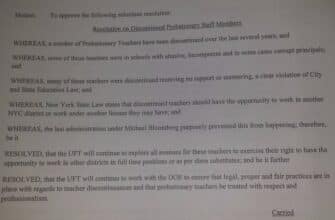Why Teachers Need Tenure (and Much More):
New York City schools fail not because they can’t fire enough teachers, but because they can’t keep them.New York City schools have never needed their veteran teachers more. According to a recent United Federation of Teachers report, over the last five years resignations among mid-career teachers with six to fifteen years of experience doubled to 43% in 2013. The troubling pattern has continued unabated for over a decade. Since 2002, 32,000 teachers have left city schools, taking their talents to districts in nearby suburban counties, where they are sure to make tens of thousands more and escape the obsessive micromanagement implemented by inexperienced principles under the Bloomberg era.
A little-heeded 2004 City Council report predicted this disastrous shortfall, citing veteran teachers’ dissatisfaction with salaries and benefits and rookie teachers’ difficulties with unmanageable class sizes and inadequate classroom resources. Yet before and after that report, the Bloomberg administration did next to nothing to address these concerns, instead pouring its energy, and precious funding, into a corporate-style campaign to decentralize the district’s governance structure and give principals free reign over their school budgets and teachers.
Brooklyn teacher Asiya Joseph is one of the many victims of Bloomberg’s governance overhaul. By most standards, Joseph is exactly the sort of teacher New York City students need. With over ten years of experience, Joseph had become a mentor to newer teachers, serving as a NYC Common Core fellow and even taking part in an Albany delegation for standard setting and vertical articulation of common core aligned state exams. But under the Bloomberg era’s war of attrition with teachers’ unions, Joseph’s other leadership role, as a United Federation of Teachers’ chapter leader, made her a target everywhere she went.
In 2013, Joseph began her first year at Brownsville Collaborative Middle School, where she claims she was only one of three teachers with previous teaching experience. According to Joseph, the previous year, principal Stacey Walsh, a rookie fresh out of Bloomberg’s notorious NYC Leadership Academy, ran the new school so poorly that almost the entire teaching staff transferred out by its second year.
As a UFT chapter leader, Joseph claims she quickly found herself needing to report contract and district violations: teachers were working extra time due to a lack of support staff and students were being deprived of legally mandated special education instructors. According to Joseph, Walsh’s verbal abuse to students and teachers drove many to psychological collapse and even suicidal thoughts:
“Stacey would have students sit in the hallways on the floor, yell at them, and say stuff like, ‘I stay up all night crying for this school, nobody care about you except for me, some of you not even your parents care about you. If this school goes down its because of you,’ claimed Joseph. “She would also tell teachers they didn’t know what they were doing, and then turn to students letting them know they were going to get someone “better.”
Joseph soon left the school, thinking her struggle with Walsh was over, but a few months later Joseph received a sudden notification from the Department of Education that she was being investigated for verbally abusing a student at Brownsville, allegations that the DOE’s Office of Special Investigation later concluded were unsubstantiated, according to Joseph.
To lend further credence to her claim that Walsh was retroactively targeting her, Joseph provided the Indypendent with two copies of teacher evaluations with the same time stamp, showing that Walsh lowered Joseph’s scores, giving her “ineffective” ratings where none had previously been marked.
To make matter worse, that April, her new school’s principal called her into the office and told her the superintendent told she had to be discontinued. According to Joseph, when she asked why a superintendent, who she had never met, would go so far as to personally order her firing, citing the fact that she had not received any warning or counseling memos before the decision, the principal simply said the superintendent had not given a reason.
After all this, Joseph transferred to district 18 that summer, where on August 29th her name was mysteriously taken off payroll. When the school’s principal pushed to get her back on payroll, Joseph claims the school’s HR department explained she had been “problem coded”—the Department of Education’s notorious method of blacklisting disobedient, untenured teachers.
In recent years, the Department of Education’s treatment of untenured teachers under the Bloomberg era has made stories like Joseph’s seem tame. Last year, after Lydia Howrilka allegedly challenged Principal Arisleyda Urena for improperly raffling away iPads, Urena discontinued the first year teacher. When Howrilka sued in response, Urena charged the young teacher with “aggravated harassment,” landing Howrilka in jail for seven hours according to The New York Post. Similarly, Staten Island principal Linda Hill tried to terminate technology teacher Francesco Portelos for a blog post that accused Hill of violating district rules. When Portelos later wrote a satirical blog post, pretending he hacked into the DOE’s payroll system to give himself a raise, the DOE immediately demanded his arrest, claiming in its police report that Portelos had made a DOE official “fearful of their safety/life.” Portelos spent thirty-three hours in a cell before the DA let him off.
Today, after over a decade of Bloomberg era reforms, such brutal tactics have become expected practice for principals, who were quickly elevated to CEO-like positions over their schools. Under Bloomberg’s Schools Chancellor Joel Klein principals were freed from traditional superintendent oversight and became responsive only to decentralized “school networks,” advised by a scattering of non-profits and universities. But back when Klein first started, many of them former veteran teachers, weren’t immediately eager to comply.
So in 2004, Klein founded the New York City Leadership Academy, a sort of Teach For America for principals that recruited ambitious young teachers and gave them control over whole schools. From the start, business leaders, not career educators, ran the Leadership Academy. One “instructor” at the academy, for example, former GE executive Jack Welch, earned his corporate management fame by creating systems for identifying and firing the so-called bottom 10% of his staff annually. This ruthless corporate logic sheds insight into the fear and compliance Bloomberg’s administration sought to elicit from teachers through a new crop of principals.
The Academy drastically refigured the city’s education landscape; today, academy graduates, comprising roughly one in six city principals, are widely feared by teachers as some of the most demanding and least knowledgeable supervisors one could have the misfortune of working under. As The New York Times reported in 2009 the influx of these high powered, unqualified principals is one of the leading factors driving New York City’s high attrition rates: “more than a quarter of teachers said in city surveys last spring that they did not trust their principals or consider them effective managers, and more than a third of those leaving the system cited the quality of school leadership as among the main reasons.” Since then Mayor de Blasio’s new Chancellor Carmen Farina has rolled back on Klein’s ambitious vision, requiring administrators gain seven years of experience before rising to the principal position, yet for many teachers the damage has already been done.
Of the seven current and former teachers who spoke to the Indypendent, all agreed that the lasting legacy of the Bloomberg years was to empower a new generation of principals to feel like they could do almost anything they wanted to teachers.
“I have never met a compassionate assistant principal or an intelligent principal,” says Tanya Thurman, who quit teaching, exhausted by constant abuse, sexual harassment, and incompetence with which unchecked administrators enveloped her. Thurman notes many of her younger colleagues often felt helpless in the face of blatant sexual harassment for fear of being refused tenure. “My assistant principal at Brooklyn High School for Law and Technology was absolutely disgusting. I walked in on him cornering a special education teacher in the library, who was totally trying to get out of there,” said Thurman to The Indypendent. “He would even eye students who came into his office. I started encouraging teachers, who started coming to me, that I could be a witness for them, but as a young teacher there’s so many fears, not just sexual harassment.”
Michelle, a veteran teacher, noted such harassment often seems to be part of a larger pattern of institutional racism, pointing to administrators’ efforts to replace tenured teachers of color, particularly black educators, with inexperienced white graduates through the closure of traditional public schools and the proliferation of unregulated charter schools. “When I think about the school building I’m in, we’re collocated {sharing space} with a charter school. Ten years ago, ninety percent of the teachers in the building were teachers of color,” she explained. “Now maybe half the teachers, mostly from the charter school, in the building are white. From what we know took place in New Orleans, Philadelphia, DC, we know that in apartheid areas where you will find most teachers of color, we are the first to go…”
As Melinda Anderson notes in Ebony the numbers bear this pattern out, “While 43 percent of Chicago students are Black, they accounted for 87 percent of affected students in schools marked for closure. The same pattern is seen in Philadelphia and New York City, and in every case Black teachers are caught in the crossfire, as they tend to be heavily concentrated in schools with predominately Black student bodies.” And as Anderson concludes even tenured educators of color are not safe, “Black teachers made up less than one-third of the tenured staff in Chicago Public Schools yet represented more than half of tenured teachers pushed out by closures and turnarounds.”
In this light, Andre Perry, an education professor at Davenport University, concludes that the nationwide attack on teacher tenure is “actually an attack on black professionals,” who are consistently paid less than their peers in unprotected, nonunion jobs. Thus, the recent moves to weaken teacher tenure laws on the part of celebrities like Campbell Brown and New York Governor Andrew Cuomo necessarily imply a demand to return black veteran educators, and other educators of color, to a less tenured and more exploitable state.
Thus, like all forms of institutional racism, the attack on tenure is a financial benefit to the state, borne off the backs of veteran educators of color. By attacking tenure, districts are empowered to push out thousands of veteran educators, who have accrued decades of pension and healthcare benefits, not to mention salaries that supersede the de facto racism of the labor market.
Despite Chancellor Farina’s recent administrative reforms, as in the Bloomberg era, principals still retain control over their school budgets. Thus, with the mass increase in high paid administrative personnel, thanks to disappointing experiments like the small schools movement, principals are perversely incentivized to push out teachers based on cost, rather than merit and experience. “In New York, if you create five or six small schools in a building designed for one school, principals can’t afford to employ veteran teachers with their reduced budget,” explains Bronx teacher Aixa Rodriguez, “So it becomes necessary to push out veteran teachers over forty, teachers of color because its economic.”
In replacing veteran educators with elite, inexperienced (and probably temporary) college graduates, as seen in programs like Teach For America and other new teaching fellowships, policymakers save millions, while relying on racist tropes of veteran public sector workers as incompetent and lazy to justify their dismissals. As Rodriguez summarized, “Education reformers stigmatize these veteran teachers in the press, jostle them from school to school, so that they can replace them with twenty-four year olds fresh from college.”
CLOSING ANECDOTE HIGHLIGHTING WHY TENURE MATTERS
Asiya’s hearing/ Tanya quotes about tenure





